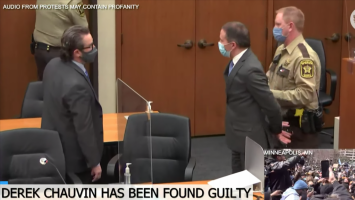Derek Chauvin requests new trial after being convicted of George Floyd’s murder

Derek Chauvin on Tuesday requested a new trial after being convicted in April of second-degree murder and other charges in the death of George Floyd.
Attorney Eric J. Nelson says in the motion that Chauvin was denied a fair trial due to “prosecutorial and jury misconduct; errors of law at trial,” and that the resulting jury’s verdict was “contrary to law.”
Chauvin, who is white, was convicted in April of second-degree unintentional murder, third-degree murder and second-degree manslaughter for pressing his knee against Floyd’s neck for more than nine minutes as the Black man said he couldn’t breathe and went motionless.
Tuesday’s motion, an expected development in the case, argues a number of reasons would justify a new trial. Among the most anticipated: that Judge Peter Cahill should not have denied the defense’s request to change the venue of the trial.
April 28: Chauvin trial juror says he didn’t feel pressure for a guilty verdict
Appeals with change-of-venue disputes at their core are rare but not unprecedented.
Nelson also said in the motion that the judge should have sequestered the jury and that failing to instruct them to avoid all media resulted in them being exposed to “prejudicial publicity regarding the trial.”
Nelson also alleges the prosecution in the case “committed pervasive, prejudicial prosecutorial misconduct, which deprived Mr. Chauvin of his constitutional rights to due process and a fair trial.”
Chauvin is scheduled to be sentenced in June. Minnesota’s attorney general last week filed paperwork asking that Chauvin be given a more severe prison sentence in the case, arguing that the former Minneapolis police officer inflicted torturous deadly methods as Floyd pleaded for his life.
“Mr. Floyd was treated with particular cruelty. … Defendant continued to maintain his position atop Mr. Floyd even as Mr. Floyd cried out that he was in pain, even as Mr. Floyd exclaimed 27 times that he could not breathe, and even as Mr. Floyd said that Defendant’s actions were killing him,” Minnesota’s Attorney General Keith Ellison said. He added that Chauvin stayed in position as Floyd cried out for his mother, stopped speaking and lost consciousness.
Prosecutors also wrote that Chauvin’s actions “inflicted gratuitous pain” and psychological distress not just on Floyd but on the civilian bystanders who they argued will be haunted by the memory of what they saw.
Four of the people in the crowd watching Floyd die were minors, the court filing said.
Contributing: Mike James; The Associated Press
Source: Read Full Article
